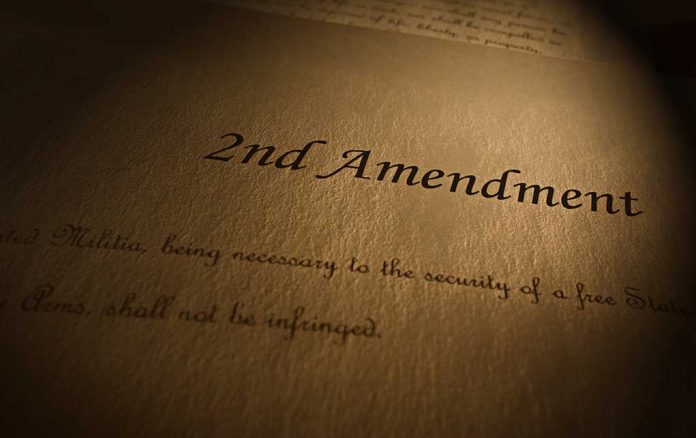
The Supreme Court will decide whether D.C.’s 10-round magazine limit violates the Second Amendment, potentially reshaping gun rights nationwide.
Key Takeaways
- Gun owners are challenging D.C.’s 10-round magazine capacity restriction at the Supreme Court, claiming it violates their Second Amendment rights.
- The D.C. Circuit Court previously upheld the magazine limit, citing Prohibition-era restrictions as a historical precedent.
- Violators of D.C.’s magazine capacity law face felony charges with up to three years imprisonment and $12,500 in fines.
- Judge Justin Walker’s dissent argued magazines over 10 rounds are in common use for lawful purposes and should be protected under the Constitution.
- The case could establish whether commonly-owned firearm components are protected by the Second Amendment, affecting similar laws nationwide.
Constitutional Challenge Reaches Supreme Court
Licensed concealed carry permit holders in Washington D.C. are asking the Supreme Court to overturn the district’s ban on magazines holding more than 10 rounds of ammunition. The Firearms Registration Amendment Act of 2008 established the restriction, making possession of larger magazines a felony punishable by up to three years in prison and a $12,500 fine. Petitioners argue that standard-capacity magazines exceeding this limit are commonly used for lawful self-defense purposes throughout the country.
Gun Owners Take DC Magazine Restrictions To Supreme Court
Gun owners in Washington, D.C. are appealing to the U.S. Supreme Court to challenge a local law that bans magazines capable of holding more than 10 rounds of ammunition. The case, known as Hanson v. District of Columbia,… pic.twitter.com/VS9Pvo0Ct2
— The Wall Street Chronicles (@ThewallstChron) March 2, 2025
The legal challenge follows the Supreme Court’s landmark 2022 decision in New York State Rifle and Pistol Association v. Bruen, which established a new test for evaluating gun restrictions. Under Bruen, government restrictions on firearms must be consistent with the nation’s historical tradition of firearm regulation. Petitioners contend that magazine capacity restrictions fail this test, as no similar restrictions existed when the Second Amendment was ratified.
Lower Courts Remain Divided
Both a federal district court and the U.S. Court of Appeals for the District of Columbia Circuit rejected the challenge, upholding D.C.’s magazine restriction. The majority opinion concluded that Washington’s goal to “mitigate the carnage of mass shootings” paralleled Prohibition-era laws restricting high-capacity weapons and imposed only a modest burden on Second Amendment rights.
Circuit Judge Justin Walker issued a strong dissent, arguing that magazines holding more than ten rounds qualify as “arms in common use for lawful purposes” and therefore cannot be banned under the Second Amendment. Walker cited the Supreme Court’s 2008 District of Columbia v. Heller decision, which established an individual right to keep and bear arms commonly used for lawful purposes, including self-defense.
Broader Implications for Gun Rights
The case highlights ongoing constitutional debates about magazine capacity restrictions enacted in multiple states and jurisdictions. The petitioners are asking the Supreme Court to determine whether the Second Amendment allows a ban on commonly used arms for lawful purposes, which could have significant implications for similar laws nationwide. Attorney George Lyon Jr., representing the petitioners, plans to argue that the D.C. Circuit misinterpreted historical analogues when upholding the ban.
The Supreme Court’s decision to take this case could provide clarity on how lower courts should apply the Bruen test to modern firearm restrictions. Gun rights advocates view the case as an opportunity for the Court to affirm that magazine capacity limits infringe on core Second Amendment protections. Meanwhile, public safety advocates maintain that such restrictions reasonably balance individual rights with the government’s interest in reducing casualties in mass shooting incidents.
Similar Battles Across States
This D.C. case is not occurring in isolation. The Washington state Supreme Court is currently considering a similar challenge to that state’s ban on large-capacity magazines. Like D.C., Washington state prohibits the sale, manufacture, distribution, and import of magazines holding more than 10 rounds, with exceptions for law enforcement and military. The state argues these magazines are military-style accessories rather than “arms” protected under constitutional provisions.
The Supreme Court’s eventual ruling on the D.C. magazine capacity restriction will likely influence how courts nationwide interpret the Second Amendment’s protections for modern firearms and their components. For gun owners across America, particularly those in states with similar restrictions, the case represents a critical test of constitutional rights in an era of evolving firearm technology and regulation.
Sources:
DC Circuit swats Second Amendment challenge to ban on extended magazines
Washington Supreme Court Hears Challenge to Ban on Large-Capacity Magazines
Gun Owners Take DC Magazine Restrictions to Supreme Court













